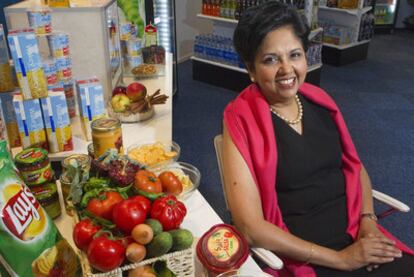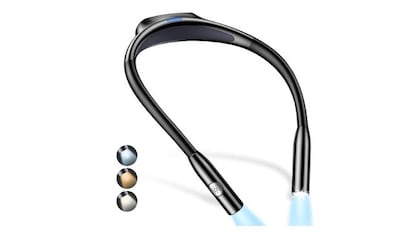"Gazpacho? We want to bring US consumers round to cold soup"
During a recent visit to Barcelona, Indra K. Nooyi, chairwoman and CEO of PepsiCo, talked to EL PAÍS about the company's investment priorities
PepsiCo is much more than Pepsi. The company includes a wide range of other well-known brands, such as Tropicana, Lays, Ruffles, Matutano, Lipton, and Alvalle, to name but a few. After Nestlé, it is the world's biggest food company, with its earnings divided evenly between soft drinks and foodstuffs. Its daily turnover is around $300 million, spread over 200 countries. So how big can the company get? The company's chairwoman and CEO, 55-year-old Indra K. Nooyi, from Chennai, talked to EL PAÍS while participating in The World Consumer Goods Forum in Barcelona last month.
Question. How does a company that is already present in every country in the world go about expanding that presence?
"Even in hard times, people want to drink a Pepsi and buy a bag of crisps"
"We will have to be careful not to affect the taste of Alvalle gazpacho"
Answer. Our strategy is to deepen and expand our presence in developing economies, to adapt to local tastes and needs.
Q. What are your main investment priorities?
A. They are centered on increasing our core business activities. We are growing our product lines and moving into new areas such as nutrition, which offers tremendous growth potential.
Q. Last year you increased turnover and profits. Will you be able to continue doing so?
A. We have committed ourselves to increasing share profitability by between 7 percent and 8 percent this year, despite an increase in the cost of raw materials and the poor economic situation.
Q. Are you feeling the effects of the economic recession in terms of consumption?
A. The markets are not as buoyant as before, particularly in the developed world, where rising unemployment is prompting changes in consumption. But the good news is that our products are the small pleasures in life that do not cost much: even in hard times, people want to drink a Pepsi and buy a bag of Matutano crisps.
Q. Leaving aside the recession, are changing food habits a danger to your companies?
A. People are beginning to eat a more balanced diet, and this is a great opportunity for us, not a danger. We have a $13-billion range of products that are good for people, and that will grow at twice the speed of our other products. We are going to grow our company at a much faster speed, and diversity, added to our global presence, will allow for sustainable growth.
Q. What happened to the proposal to tax fizzy drinks in a bid to fight obesity?
A. That was an idea, but it never materialized, at least not in terms of taxes. It's been understood that the fight against obesity is about education, about the way children are fed at school, and that simply taxing certain products is discriminatory and does little to reduce obesity. Food is neither good nor bad; it is about how much one eats of a certain food that counts.
Q. But you have agreed to reduce sodium, sugar and saturated fats in your products...
A. As the world's second-biggest food and drinks company, we have decided to improve the nutritional content of our products without sacrificing their taste, as well as labeling them more clearly. We want to offer our consumers a greater variety of products based on fruits, vegetables and dairy products, and to make them available at reasonable prices.
Q. What are PepsiCo's strengths compared to its main competitor Coca-Cola?
A. PepsiCo is an enormously diversified company. Around half of our products are foodstuffs, and the other half drinks. Even in the drinks category we offer a wide variety: juices, soft drinks, teas and waters. Our competition isn't this or that soft drink, but all the drinks in a given market. PepsiCo will continue its strategy of being a diversified company, and doing what it does well.
Q. How are you managing to deal with the impact of social networks on your products? For example, the new Tropicana packaging provoked a storm of protests online, obliging the company to do a U-turn.
A. Social networks can be a force for good and for bad; for good when they try to change society for the better. But they can also make big issues out of unimportant matters. This is what happened with Tropicana. In the trials, people wanted the new packaging, but then they changed their minds, and wanted the old packaging back. But we sell so many units that in two weeks we changed it. The cost was minimal.
Q. What plans do you have for Alvalle within the new range of healthy eating products you are working on?
A. Alvalle gazpacho is one of the pearls in our range. It is a phenomenal product, so I must say thank you to Spain for inventing this spectacular soup. We already export 40 percent of Alvalle's production to France and Belgium, and we want to enter new markets. But we will have to be careful not to affect the taste of the product. We are working on exporting it to the United States - we are going to conduct trials with American consumers, to bring them round to drinking cold soups, which is a very healthy thing to do.

Tu suscripción se está usando en otro dispositivo
¿Quieres añadir otro usuario a tu suscripción?
Si continúas leyendo en este dispositivo, no se podrá leer en el otro.
FlechaTu suscripción se está usando en otro dispositivo y solo puedes acceder a EL PAÍS desde un dispositivo a la vez.
Si quieres compartir tu cuenta, cambia tu suscripción a la modalidad Premium, así podrás añadir otro usuario. Cada uno accederá con su propia cuenta de email, lo que os permitirá personalizar vuestra experiencia en EL PAÍS.
¿Tienes una suscripción de empresa? Accede aquí para contratar más cuentas.
En el caso de no saber quién está usando tu cuenta, te recomendamos cambiar tu contraseña aquí.
Si decides continuar compartiendo tu cuenta, este mensaje se mostrará en tu dispositivo y en el de la otra persona que está usando tu cuenta de forma indefinida, afectando a tu experiencia de lectura. Puedes consultar aquí los términos y condiciones de la suscripción digital.




























































